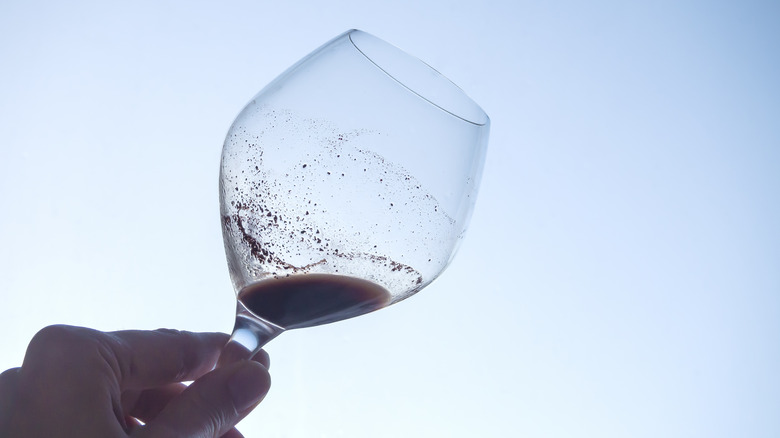The Crucial Role Tannins Play In Red Wine
From which foods to pair them with, to whether they stain your teeth or give you headaches, red and white wine have their fair share of differences. But when it comes to individual components, both types have some major ones in common. The most obvious being that they're both made from grapes, and they're mostly comprised of water from those grapes — about 80-90% of wine is water (via Triangle Wine Country). Alcohol in the form of ethanol is another major component, while sugar, acids, and polyphenols comprise the rest of the adult grape juice.
Per Wine Enthusiast, white and red wines are made via the same essential process. However, there is one defining difference — the juice of the grape is separated from the grape skin prior to the fermentation process for white wine. For red wine, the skin is left in during maceration and fermentation along with the juice. Not only does this contribute to the color of red wine, it affects its taste, nutrition, and texture. The skin is also where tannins mostly reside, and these compounds play a crucial role in what makes red wine what it is, for two apparent reasons.
Taste and storage
The important role of tannins in red wine is twofold. They are what give red wine the distinct, drier mouthfeel it is known for, per Cornell College of Agriculture and Life Sciences. Tannins are molecules found in nature, and are also known as polyphenols, which are plant compounds known for their nutritive properties. They serve as a plant's defense mechanism by releasing a bitter taste to any predators consuming them. We experience this sharp taste and astringent texture when we consume them — think strong, black tea, or 100% dark chocolate coating your tongue.
The level of tannins present in a wine directly correlates to its aging potential (via Wine Maker). They're the reason an opened bottle of white wine that's sealed airtight and stored in the fridge only makes it a handful of days, whereas a bottle of opened red can hang out on the counter, even corkless, and taste just fine — if not better — the next day. Tannins are an antioxidant, meaning they bind to oxygen and protect the wine from spoiling. This also explains the purpose of decanting red wine, which is to allow the tannins to soften via oxygenation for a smoother flavor, per Blog Your Wine.

